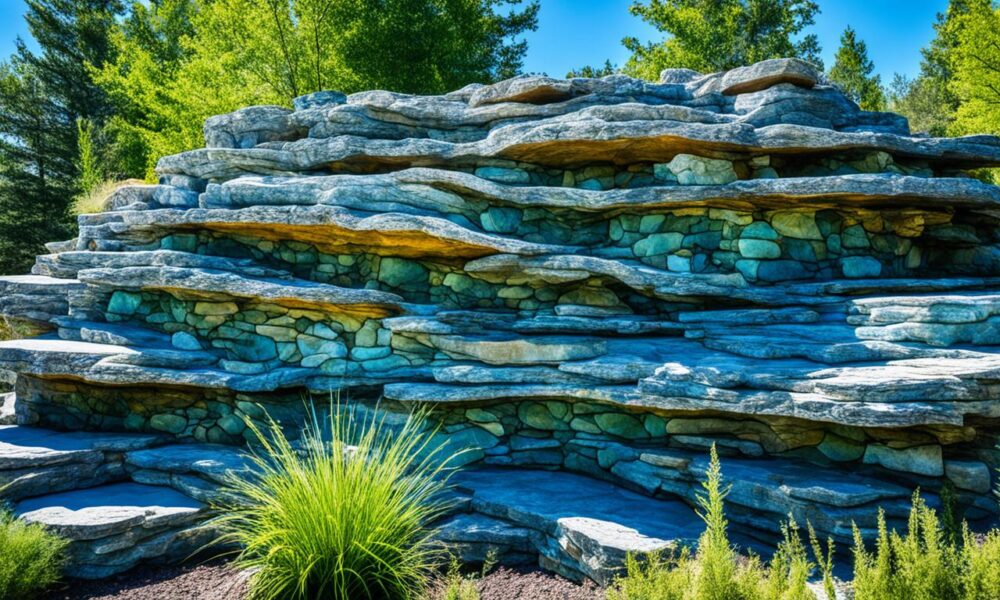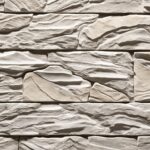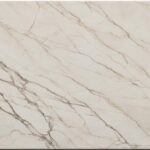Selecting the Ideal Stone Finish for Your Project
Natural stone brings unique colors, patterns, and textures to the table. Its finish greatly affects both looks and upkeep needs. Stones like granite, marble, and travertine have finishes that boost their beauty and fit project requirements. For instance, the Bintang Tuff Floor Tile is a top pick for lobbies. It has a tough finish that’s slip-resistant and easy to care for1.
Choosing the right stone finish means understanding the benefits of each option. This is important whether it’s for countertops, floors, or decor. For outdoor stone floors, a P5 rating is essential for safety1. Stone cladding thickness also varies, which impacts how it’s handled1. Granite is especially popular for big projects due to its strength and uniform look2.
Experts like Z Stone help from choosing to installing the perfect stone finish. They make sure the finish enhances both your design and the stone’s function. It’s key to look at each finish’s unique traits to find what’s best for your project.
Key Takeaways
- Natural stone finishes greatly influence looks and maintenance.
- Understanding each finish’s special qualities helps in making the perfect choice.
- Outdoor stone floors need to meet high anti-slip standards1.
- Granite, marble, and travertine are popular for their unique features.
- Guidance from experts like Z Stone is crucial for choosing the right finish.
Understanding Different Natural Stone Finishes
Choosing the right natural stone finish means knowing what looks good and works well. Each finish type has unique traits that fit specific needs, making sure you get the best out of your project.
Polished Finish
Polished stone shines brightly, showing off its colors and patterns3. It’s great for indoor walls, floors, benchtops, and kitchen counters because it’s easy to clean and spill-resistant3. But, it’s not the best for outdoor areas or bathroom floors since it can be slippery4. To keep its shine, it needs regular care like repolishing5.
Honed Finish
Honed finishes give a smooth, matte look that’s ideal for floors, bathrooms, and busy spots like lobbies5. They prevent slips and hide scratches well, especially in marble. Yet, they’re more likely to stain and need extra cleaning5. Matte finishes create a natural, cozy vibe.
Leathered Finish
Leathered, or brushed stone, has a unique feel with a bit of texture, bringing out the best in dark stones like granite5. It’s good for many places, like countertops and fireplaces, because it’s pretty and low-maintenance4. Plus, it protects the stone and enhances its color, making spaces like outdoor bars warm and welcoming5.
Flamed Finish
Flamed finishes are made by blasting stone with intense heat, making them rough and slip-proof3. This is perfect for outdoor uses like paths, patios, and walkways4. It offers a practical and beautiful solution for outside settings.
Natural Cleft Finish
Natural cleft finishes keep the stone’s original touch, great for walkways and patios. This finish reveals the stone’s raw beauty, giving a genuine textured feel without losing function.
Lychee Finish
The lychee finish, with its unique bush-hammered look, offers a rough surface. It’s often seen on stair treads and design details, providing a mix of beauty and safety for different areas.
Evaluating Your Project Needs
Choosing the right stone finish means thinking carefully about your project. It’s important to match the stone’s finish with its use. This ensures it meets both practical and style goals.
Indoor vs Outdoor Applications
Picking the right natural stone for inside or outside is key. Inside, you might want polished stones for their look and easy care. Outside, you’ll need durable, slip-resistant finishes like flamed or natural cleft. Stones that don’t soak up much water are best for outdoor use, especially in places with water and salt6.
High-Traffic Areas
In areas with lots of people walking through, choose tough stones like granite or quartzite. They can handle a lot of use without showing much wear. Tests, like the ASTM C241 and ASTM C1353, help figure out if a stone is good for flooring. Evolve Stone is good for busy spots too. It’s light, around 2 lbs/sqft, looks great, and gets put in place fast7.
Decorative Elements
Adding decorative stone can make a space look better. Stones like marble or limestone bring luxury to decoration. It’s a good idea to see a sample or make a mock-up to imagine how it will look. ASTM standards give design teams a way to choose stone wisely, thanks to consistent testing and procedures6.
Choosing the Right Finish for Your Natural Stone Project
Picking the right finish for your natural stone is crucial. It involves looking at both how it works and looks. The main stone finishes are Rock-Faced, Thermal, Bush-Hammered, Sawn, and Honed8. Each one has unique features for different needs.
Rock-Faced finish is great for the edges of stone slabs8. The Thermal finish provides a safe, non-skid texture for outdoor walking paths8.
For busy areas, Bush-Hammered finish adds slip resistance, perfect for steps8. Sawn finish, on the other hand, gives a sleek, flat surface8.
Honed finish, made by grinding and sanding, looks smooth but not shiny. It’s good for modern places like fireplace mantels8. Quartzite and Marble are top picks for countertops. Quartzite is strong and looks like marble but is easier to care for. Marble looks classic but gets scratched easily, though honed finishes can help hide these marks9.
Granite is both tough and affordable, especially honed black granite. Soapstone, while scratch-prone, adds a unique touch in green and gray tones9.
Indoors, polished finishes are chosen for their sleekness in kitchens and bathrooms10. Honed finishes give countertops and floors a modern look10. Leathered finishes add texture to quartzite, granite, and marble10. For outdoors, flamed and natural cleft finishes are slip-resistant, great for patios and walls10.
Talking to stone experts or using guides helps simplify choosing a finish. It’s important that the finish fits both the project’s function and style. The goal is to show off the stone’s beauty while making sure it suits the area’s needs.
Impact of Stone Finish on Maintenance and Durability
The type of stone finish plays a big role in how you take care of it and how long it lasts. It’s important to know how different finishes need different care. This keeps the stone looking good and lasting longer.
Care and Cleaning Requirements
Each stone finish has its own cleaning needs. Polished finishes shine and show off the stone’s color. They are often seen on indoor floors and countertops11. Yet, they need regular touch-ups to keep their sparkle and avoid scratches11. Honed finishes work great for busy places because they hide scratches and dust well. They have a more matte look11.
Leathered finishes are good for darker stones like granite. They hide fingerprints and marks because of their textured surface11. Stone exposed to high heat gets a flamed finish. It’s tough and works well for outdoor spaces like walkways11.
Resistance to Wear and Tear
Some finishes are better at handling wear and tear. Marble is a top choice for kitchens and floors because it’s beautiful and strong12. Quartzite is another great option. It’s made under great heat and pressure, so it’s very tough12.
Slate might not be as tough as granite or quartzite, but it can take on a lot of weight. Still, it may crack if not handled right when putting it in place12. Slate needs regular sealing to keep stains away and stay in good shape12.
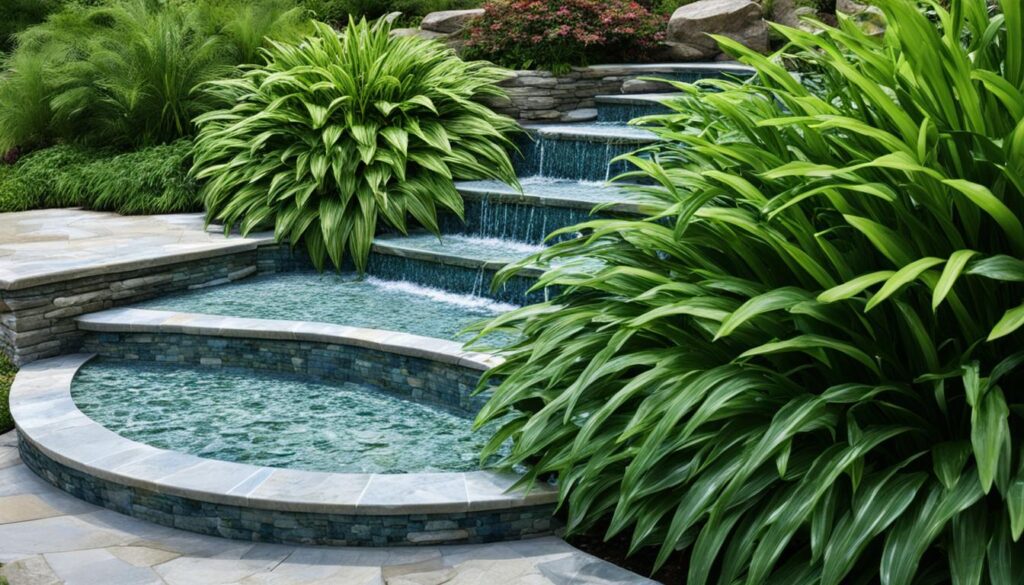
Longevity of Different Finishes
How long a finish lasts depends on the type and how well you take care of it. Polished finishes need more up-keep to keep looking good11. Honed and leathered finishes are easier to maintain. They’re great for busy areas because they hide scratches well11. This helps them last longer.
For places that see a lot of action, textured finishes like flamed and lychee are best. They’re tough and don’t need a lot of care. Choosing and taking care of the right finish means your stone will last longer. This knowledge is key to picking durable stone finishes and keeping them looking great.
Stone Sealing Options and Their Importance
Sealing natural stone surfaces is key to keeping them looking great and lasting long. It shields the stone from stains, moisture, and weather. Knowing the various sealing options, how to apply them, and how often is vital.
Types of Sealants
There are mainly two kinds of sealants—penetrating and surface sealers. Penetrating sealers are perfect for stones like limestone, as they go deep into the pores13. Surface sealers are better for stones like granite, creating a barrier on top13. Synthetic sealers handle harsh weather well13. Each of these makes the stone more resistant to harm.
Sealing Frequency
How often you seal stone depends on its type, finish, and where it’s used. Limestone, for instance, needs more sealing than marble14. Bathrooms need more sealing than kitchens14. Sealers also make cleaning easier15. Plus, some protect against the sun, stopping fading13.
Application Methods
Applying sealers correctly is crucial for the best protection and to extend the stone’s beauty. You can apply many sealers yourself, without professional help15. Choosing the right sealer for your stone’s needs is important. For example, some sealers repel water and others oil14.
The way you apply a sealer matters too. Some sealers can make the stone’s color richer13. Others protect outdoor stones from weather, stopping erosion and color loss13. This full approach keeps natural stone looking good and lasting longer.
Visual and Aesthetic Considerations
Choosing natural stone needs a focus on its looks and style. The stone’s finish must boost its beauty and fit the design theme well.
Aligning with Design Themes
Matching stone with your room’s look is key for a welcoming space. The finish matters a lot for blending with the room’s design. Think about colors and styles to add to the room’s vibe natural stone slab16. Pick finishes that mix well, so the stone looks right and adds charm.
Enhancing Natural Stone Colors and Patterns
Picking a good finish can make the stone’s colors and patterns pop more. Granite is tough and heat-safe, great for kitchens16. Marble looks classic but needs care because it’s porous16. Designers should look at the size, thickness, and surface to make sure it looks good and works well[https://ncmarbleandpavers.com/choosing-the-right-custom-natural-stone-a-guide-to-selecting-your-ideal-slab/].
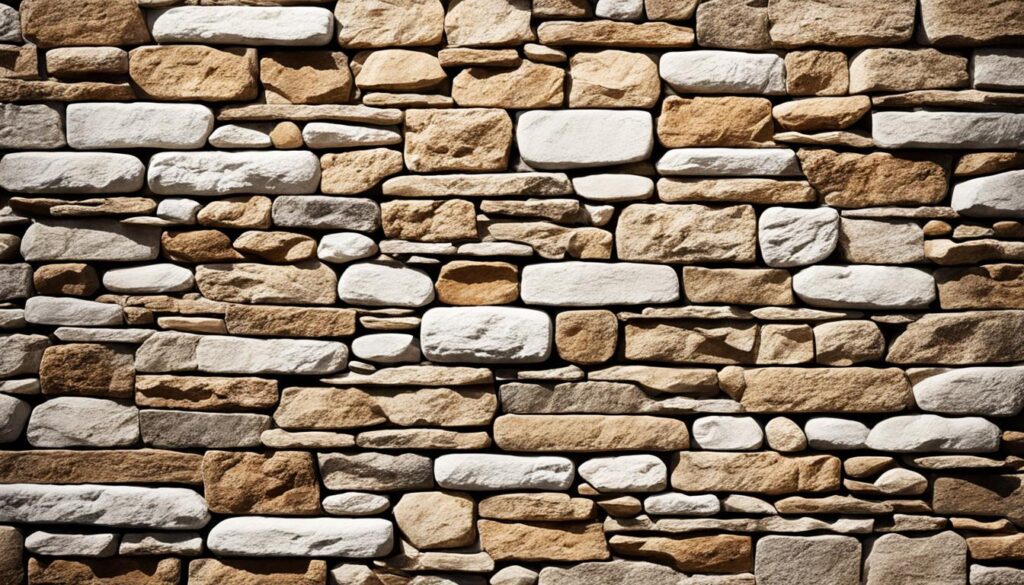
Balancing Texture and Appearance
It’s important to get the texture right so it interests but doesn’t overpower. Polished stones are hard and resist scratches16. Textured stones such as quartzite look dramatic and are tough like granite16. They can be the main attraction in a space.
Yet, soft finishes like honed or leathered stones add finesse. Think about how light plays with the stone and matches other room details. Choosing the right stones and finishes makes the room harmonious, highlighting the stone’s natural beauty.
Best Stone Finish for Outdoor Projects
Choosing the right stone finish for outdoor use is crucial. It affects how your project looks and lasts. A smart choice adds beauty and stands up to weather beautifully.
Thermal, natural cleft, and honed finishes are top picks for the outdoors. Thermal finishes have a textured look and are easy to clean, perfect for many uses17. Honed finishes feel nice underfoot, ideal for pool decks, but don’t mix well with winter salts17. Natural cleft finishes look great but might be tough in cold weather because of their uneven surfaces17.
For pool areas and patios, avoid rough and dark stones that get too hot. Lighter stones like travertine and quartzite keep things cool and comfy17. Indiana limestone, especially honed, is gaining fans for being slip-resistant and looking sharp18.
Outdoor kitchens and fireplaces should have stones that match each other, especially if they’re on patios17. Dark stones work well for outdoor kitchen counters because they hide stains. Yet, lighter stones look better and last longer with the right finishes17.
Justin Alicandro recommends spending a bit more on natural stone finishes for big projects like pools. This extra investment makes your project more stunning and durable17.
Your stone finish should match the landscape and architecture, making everything look and work great together. Flamed limestone is great for public areas because it prevents slipping18. Bush-hammered finishes are also non-slip, making them suitable for different outdoor spots18.
Conclusion
Choosing the right stone finish is very important. You need to think about how it will be used, how long it will last, how it looks, and how much care it needs. If you want something that looks shiny and resists stains19, a polished finish might be best. For places with lots of foot traffic19, a honed finish could work better. Or, choose a leathered finish if you like a unique texture along with stain resistance19. It’s smart to ask for professional advice to make sure the finish you pick is the best for your project.
It’s good to know about all the different stone finishes, like polished, honed, flamed, and tumbled20. Each type brings something special, like a flamed finish that’s great for outdoor areas20, or a tumbled finish that’s tough enough for busy spots20. Also, new tech and focusing on the environment can make natural stone floors last longer and look better21. So, it’s important to keep these things in mind when deciding.
In the end, the stone finish you choose will make your natural stone’s beauty last. It will look good and be useful for a long time. By thinking carefully and working with experts, you can pick a finish that’s both practical and stylish. Your careful choice will make your stone project stand out as a truly successful decision. It’s a lasting choice that you’ll be proud of.
FAQ
What are the most common natural stone finishes?
What is the best stone finish for an outdoor project?
How do I choose the right stone finish for my project?
How often should natural stone be sealed?
What are the maintenance needs for different stone finishes?
What are the different types of sealants for natural stone?
Can natural stone finishes enhance the design of a space?
How does the finish affect the durability of natural stone?
What is a leathered finish, and where is it best used?
What should I consider when selecting a finish for high-traffic areas?
Source Links
- How to Choose the Right Natural Stone for Your Commercial Project – Worldstone Solutions
- Everything to Know About Types of Stone Finishes | Cosmos Surfaces
- 10 types of natural stone finishes
- Different Types of Natural Stone Finishes
- Understanding Stone Finishes: A Guide To Differentiating The Most Common Ones
- Testing Standards for Natural Stone: What They Are, Why They Matter – Coldspring
- How to Choose the Right Mortarless Stone Veneer for Your Project – Evolve Stone
- What Finish Is Right for Your Natural Stone – Kafka Granite
- How to Choose Natural Stone That’s Right for Your Home – Jenny Komenda
- Types of Stone Finishes: Which is Best for Your Project? – ZStone Creations
- What Are the Different Types of Stone Finishes and Do They Affect Maintenance?
- What is the Most Durable Natural Stone? Insights from a Leading Natural Stone Supplier – Terra Stone Gallery
- Exterior Stone Sealers – Best Sealers – TSS Pro Sealants
- Guidelines for Sealing Your Natural Stone | East Coast Flooring
- A Guide to the Best Stone Sealers of 2023
- Choosing the Right Custom Natural Stone: A Guide to Selecting Your Ideal Slab
- From Patios to Pools: The Secret To Choosing The Right Stone
- General Types of Limestone Finishes | Stone Center
- Exploring Natural Stone Finishes: A Comprehensive Guide
- Natural Stone Finishes – Great Lakes Granite & Marble
- Unveiling the Secrets to Natural Stone Floor Selection from Design Experts – Carmel Stone Imports

